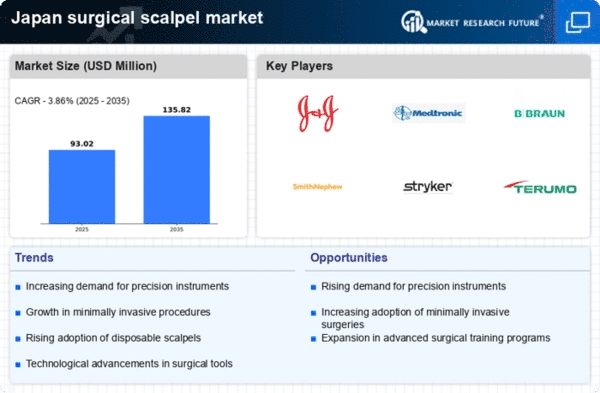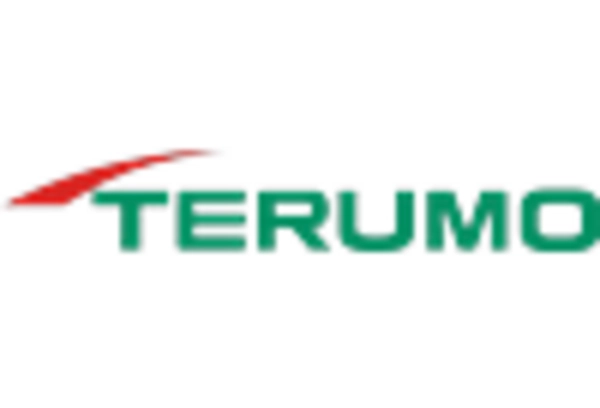Focus on Surgical Precision
The emphasis on surgical precision in Japan is a key driver for the surgical scalpel market. Surgeons are increasingly seeking tools that enhance accuracy and minimize tissue damage during procedures. This focus on precision is particularly relevant in minimally invasive surgeries, where the use of advanced scalpels can significantly impact patient recovery times and outcomes. In 2025, the market for precision surgical instruments, including scalpels, is projected to grow by approximately 5%, reflecting the increasing demand for high-performance surgical tools. Manufacturers are responding to this trend by developing scalpels with improved ergonomics and cutting-edge materials that facilitate precise incisions. As the healthcare sector continues to prioritize patient safety and surgical efficacy, the surgical scalpel market is likely to thrive, driven by innovations that cater to the need for precision in surgical practices.
Surge in Surgical Procedures
The surgical scalpel market is positively influenced by the surge in surgical procedures across various medical specialties in Japan. With advancements in surgical techniques and an increase in the prevalence of chronic diseases, the number of surgeries performed is on the rise. In 2025, it is estimated that over 10 million surgical procedures will be conducted in Japan, marking a significant increase compared to previous years. This trend is particularly evident in fields such as orthopedics, cardiology, and oncology, where surgical interventions are critical. As the volume of surgeries increases, the demand for high-quality surgical scalpels is expected to grow correspondingly. This surge in surgical activity not only boosts the market but also encourages manufacturers to innovate and improve their product offerings to meet the evolving needs of healthcare professionals.
Increasing Healthcare Expenditure
The surgical scalpel market in Japan is experiencing growth due to the rising healthcare expenditure. The Japanese government has been investing significantly in healthcare infrastructure, which has led to an increase in the number of surgical procedures performed annually. In 2025, healthcare spending is projected to reach approximately $500 billion, reflecting a growth rate of around 3% from previous years. This increase in funding allows hospitals and surgical centers to acquire advanced surgical instruments, including scalpels, thereby enhancing surgical outcomes. Furthermore, the aging population in Japan necessitates more surgical interventions, further driving the demand for surgical scalpels. As healthcare facilities expand and modernize, the surgical scalpel market is likely to benefit from improved access to high-quality surgical tools, which are essential for effective patient care.
Rising Awareness of Surgical Safety
The surgical scalpel market is benefiting from the rising awareness of surgical safety among healthcare professionals and patients in Japan. There is a growing recognition of the importance of using high-quality surgical instruments to reduce the risk of complications during surgeries. In 2025, it is anticipated that approximately 70% of surgical teams will prioritize the use of certified and reliable surgical tools, including scalpels, to ensure optimal patient outcomes. This heightened awareness is prompting hospitals and surgical centers to invest in superior surgical instruments, thereby driving demand in the market. Additionally, educational initiatives aimed at promoting best practices in surgical safety are further reinforcing the need for high-quality scalpels. As the focus on patient safety intensifies, the surgical scalpel market is likely to see sustained growth, as healthcare providers seek to enhance their surgical practices.
Technological Integration in Surgical Tools
The integration of technology in surgical tools is emerging as a significant driver for the surgical scalpel market in Japan. Innovations such as smart scalpels equipped with sensors and imaging capabilities are gaining traction among surgeons. These advanced tools not only improve surgical precision but also provide real-time feedback during procedures. In 2025, the market for technologically advanced surgical instruments is expected to grow by around 4%, reflecting the increasing adoption of such innovations in operating rooms. As hospitals and surgical centers strive to enhance surgical outcomes, the demand for technologically integrated scalpels is likely to rise. This trend indicates a shift towards more sophisticated surgical practices, where the combination of traditional craftsmanship and modern technology plays a crucial role in improving patient care and surgical efficiency.
















